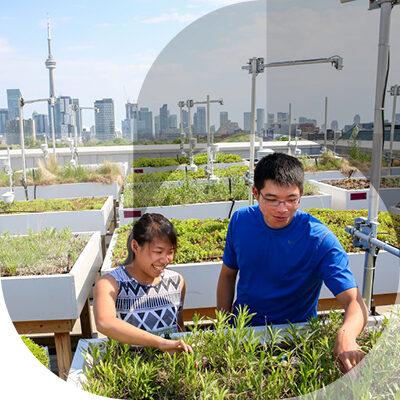University of Toronto
Engineering Graduate Studies
Department of Civil & Mineral Engineering (CivMin)
Civil and mineral engineering involves creating a better future for humanity, as well as the planet. We plan, design, construct and maintain the built environment, shaping major decisions for society. Simultaneously addressing sustainable development of infrastructure and its environmental impact enables us to deliver globally liveable cities and the resources they require.
Global challenges of climate change, as well as other pressing world problems, lead Global challenges, ranging from climate change and resource scarcity to clean air, safe water, sustainable energy and resilient infrastructure, demand innovative engineering solutions. Our researchers and students develop technologies and strategies that emphasize sustainability, durability and long-term impact. Our interconnected societies demand global cities that are able to respond, adapt and thrive alongside corresponding sectors like construction, mining and transportation.
Collaboration is at the heart of what we do. We work closely with industry partners, governments and world-class institutions around the world, as well as research centres and institutes within the University of Toronto, including the Centre for Resilience of Critical Infrastructure, School of Cities, Lassonde Institute of Mining, Centre for Analytics and AI Engineering, Lawson Climate Institute and the Mobility Network.
Our graduate students study a range of topics including our major areas of research and teaching. As a thriving centre for business and academic research, Toronto is the ideal place for a graduate student in civil or mineral engineering. Our graduates are in demand, and many are in a position to choose from several attractive job offers upon graduation.

Department at a glance
- Home to several unique facilities including one of North America’s largest structural labs, a Twin Suites Rooftop lab, a Robotic Fabrication Atelier, the urban scanner, and the Rock Fracture Dynamics Facility
- More than 300 graduate students from across Canada and around the world
- Alumni network of more than 8,000 globally
- 17 funded research chairs
- 18 professors listed in top 2% of research scientists worldwide
- Students from a wide range of engineering and scientific backgrounds are welcome here
Research areas
- Built Environment
- Building Science
- Concrete materials
- Construction Management
- Environmental Engineering
- Geomechanics and Mining
- Structural Engineering
- Sustainability
- Transportation Engineering and Planning
- Water resources
...and more
Master of Engineering in Cities Engineering and Management
MEngCEM
This elite degree prepares engineers to address the pressing issues of cities and create solutions that are sustainable, socially engaging and economically feasible. The MEngCEM includes coursework and a paid, four-month practicum.
Admission Requirements: Mid-B average (75% or international equivalent) in the final year of your bachelor’s degree and at least one year of work experience.
Length of Study: 1 year of full-time study or 2 years of extended full-time study
Specialization Areas: Transportation Systems; Cyber Security; Urban Structures; Sustainable Energy Systems; Operations Research; Environmental Issues for Healthy Cities; Resilience of Critical Infrastructure; Communication Networks
Domestic Tuition (2025–2026, full-time): $15,618
International Tuition (2025–2026, full-time): $73,760
Deadline: May 31 (domestic), April 15 (international)
Apply by November 15, 2025 to start in January 2026.
Master of Engineering
MEng
This degree provides advanced professional training. You can complete it by coursework only, or by combining coursework with a design project. Tailor your MEng through emphases within the Department or Faculty:
Department Emphases:
- Building Science
- Concrete
- Construction Management
- Environmental Engineering
- Geotechnical Engineering
- Structural Engineering
- Sustainable Urban Systems
- Transportation Engineering and Planning
Starting this fall, you can also apply to gain industry experience with a paid, eight-month MEng Co-op. Spaces are limited. Learn more about MEng Co-op »
Length of Study: 1 year of full-time study, 2 years of extended full-time study, 3 years of part-time study
Admission Requirements: Mid-B average (75% or international equivalent) in the final year of your bachelor’s degree (typically in civil engineering).
Domestic Tuition (2025–2026, full-time): $15,618
International Tuition (2024–2025, full-time): $73,760
Deadline: May 31 (domestic), April 15 (international)
Apply by November 15, 2025 to start in January 2026
Master of Applied Science
MASc
The MASc lays a foundation for research with specialized coursework. Many research projects involve industrial partnerships, networking opportunities and project management experience.
As an MASc student, you will be eligible to receive a minimum of $21,000 plus tuition and fees per year for up to two years of study.
Admission Requirements: A four-year degree (or equivalent) in engineering or the physical/chemical/biological sciences with a mid-B average (or equivalent) in each of the final two years.
Length of Study: 2 years of full-time study
Domestic Tuition (2025–2026, full-time): $8,448
International Tuition (2024–2025, full-time): $34,900
Deadline: Apply by February 15 to start in September 2026.
Alternate start dates are available.
Doctor of Philosophy
PhD
The PhD is for outstanding students interested in a rewarding career in fundamental or applied research. It involves advanced courses and an intensive research program culminating in a thesis. As a PhD student, you will be eligible to receive a minimum of $31,000 plus tuition and fees (i.e., $40,000 total funding) per year for up to four years of study.
Admission Requirements: B+ average (78% or international equivalent) in each of the last two years of bachelor’s and master’s study.
Length of Study: 4 years full-time, 5 years direct-entry, 6 years flexible-time
Domestic Tuition (2025–2026, full-time): $8,448
International Tuition (2025–2026, full-time): $9,240
Deadline: Apply by February 15 to start in September 2026.
Alternate start dates are available.
There is a minimum English proficiency requirement for all applicants educated outside Canada whose primary language is not English. Please visit the CivMin admission requirements webpage to determine whether you are required to take a test and for a list of accepted tests and their minimum required scores.
All tuition amounts include incidental fees.
For further information, contact:
Civil & Mineral Engineering Graduate Studies Office
Admissions Coordinator
Email: admissions.civmin@utoronto.ca
Web: www.civmin.utoronto.ca
Office: 35 St. George Street, Room 116, Toronto, Ontario, M5S 1A4 Canada
